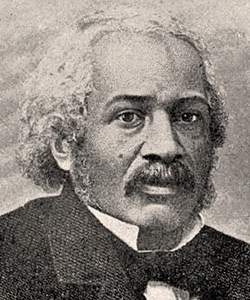James McCune Smith (American National Biography)
Scholarship
Smith's activities as a radical abolitionist and reformer, however, secured his reputation as one of the leading black intellectuals of the antebellum era. As soon as he returned to the United States, he became an active member of the American Anti-Slavery Society, which sought immediate abolition by convincing slaveholders through moral persuasion to renounce the sin of slavery and emancipate their slaves. By the late 1840s he had abandoned the policies of nonresistance and nonvoting set forth by William Lloyd Garrison and his followers in the society. Instead, Smith favored political abolitionism, which interpreted the U.S. Constitution as an antislavery document and advocated political and ultimately violent intervention to end slavery. In 1846 Smith championed the campaign for unrestricted black suffrage in New York State; that same year he became an associate and good friend of Gerrit Smith, a wealthy white abolitionist and philanthropist, and served as one of three black administrators for his friend's donation of roughly fifty acres apiece to some 3,000 New York blacks on a vast tract of land in the Adirondacks. He became affiliated with the Liberty Party in the late 1840s, which was devoted to immediate and unconditional emancipation, unrestricted suffrage for all men and women, and land reform…When the Radical Abolition Party, the successor to the Liberty Party, nominated him for New York secretary of state in 1857, he became the first black in the country to run for a political office.
John Stauffer, "Smith, James McCune," American National Biography Online, February 2000, http://www.anb.org/articles/16/16-01529.html.


